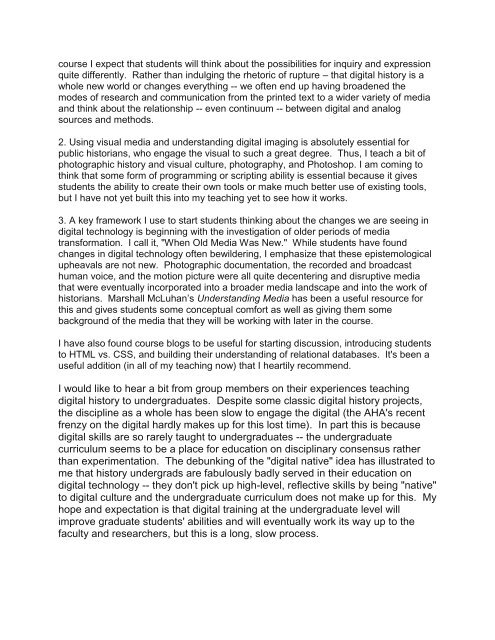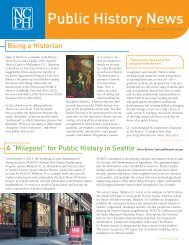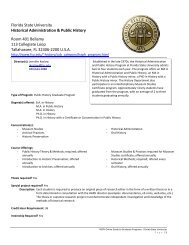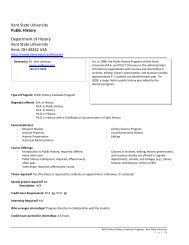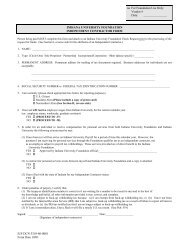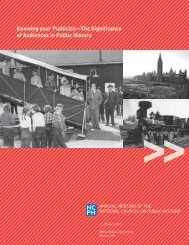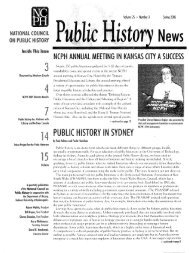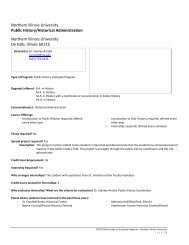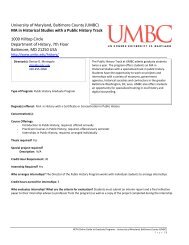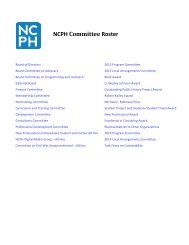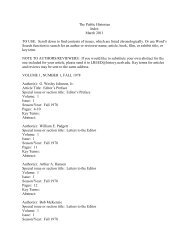Case Statement - National Council on Public History
Case Statement - National Council on Public History
Case Statement - National Council on Public History
You also want an ePaper? Increase the reach of your titles
YUMPU automatically turns print PDFs into web optimized ePapers that Google loves.
course I expect that students will think about the possibilities for inquiry and expressi<strong>on</strong><br />
quite differently. Rather than indulging the rhetoric of rupture – that digital history is a<br />
whole new world or changes everything -- we often end up having broadened the<br />
modes of research and communicati<strong>on</strong> from the printed text to a wider variety of media<br />
and think about the relati<strong>on</strong>ship -- even c<strong>on</strong>tinuum -- between digital and analog<br />
sources and methods.<br />
2. Using visual media and understanding digital imaging is absolutely essential for<br />
public historians, who engage the visual to such a great degree. Thus, I teach a bit of<br />
photographic history and visual culture, photography, and Photoshop. I am coming to<br />
think that some form of programming or scripting ability is essential because it gives<br />
students the ability to create their own tools or make much better use of existing tools,<br />
but I have not yet built this into my teaching yet to see how it works.<br />
3. A key framework I use to start students thinking about the changes we are seeing in<br />
digital technology is beginning with the investigati<strong>on</strong> of older periods of media<br />
transformati<strong>on</strong>. I call it, "When Old Media Was New." While students have found<br />
changes in digital technology often bewildering, I emphasize that these epistemological<br />
upheavals are not new. Photographic documentati<strong>on</strong>, the recorded and broadcast<br />
human voice, and the moti<strong>on</strong> picture were all quite decentering and disruptive media<br />
that were eventually incorporated into a broader media landscape and into the work of<br />
historians. Marshall McLuhan’s Understanding Media has been a useful resource for<br />
this and gives students some c<strong>on</strong>ceptual comfort as well as giving them some<br />
background of the media that they will be working with later in the course.<br />
I have also found course blogs to be useful for starting discussi<strong>on</strong>, introducing students<br />
to HTML vs. CSS, and building their understanding of relati<strong>on</strong>al databases. It's been a<br />
useful additi<strong>on</strong> (in all of my teaching now) that I heartily recommend.<br />
I would like to hear a bit from group members <strong>on</strong> their experiences teaching<br />
digital history to undergraduates. Despite some classic digital history projects,<br />
the discipline as a whole has been slow to engage the digital (the AHA's recent<br />
frenzy <strong>on</strong> the digital hardly makes up for this lost time). In part this is because<br />
digital skills are so rarely taught to undergraduates -- the undergraduate<br />
curriculum seems to be a place for educati<strong>on</strong> <strong>on</strong> disciplinary c<strong>on</strong>sensus rather<br />
than experimentati<strong>on</strong>. The debunking of the "digital native" idea has illustrated to<br />
me that history undergrads are fabulously badly served in their educati<strong>on</strong> <strong>on</strong><br />
digital technology -- they d<strong>on</strong>'t pick up high-level, reflective skills by being "native"<br />
to digital culture and the undergraduate curriculum does not make up for this. My<br />
hope and expectati<strong>on</strong> is that digital training at the undergraduate level will<br />
improve graduate students' abilities and will eventually work its way up to the<br />
faculty and researchers, but this is a l<strong>on</strong>g, slow process.


